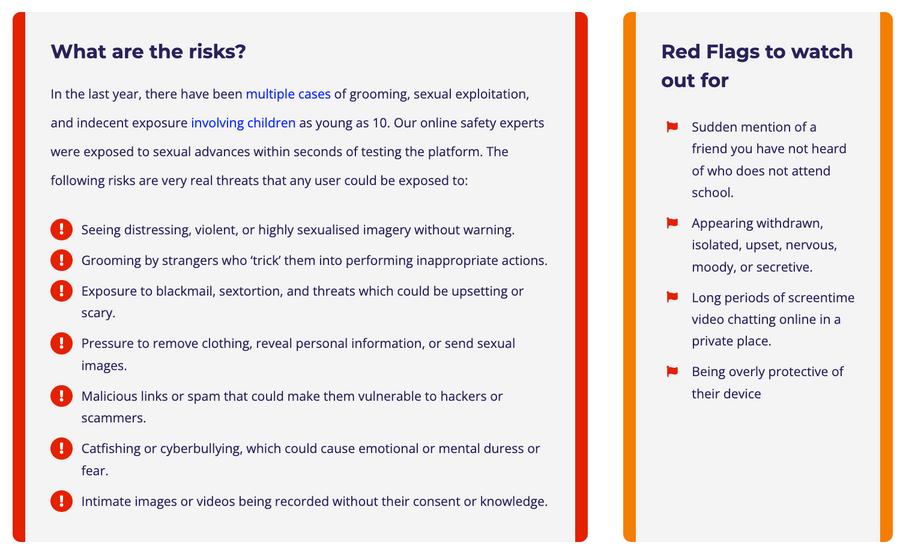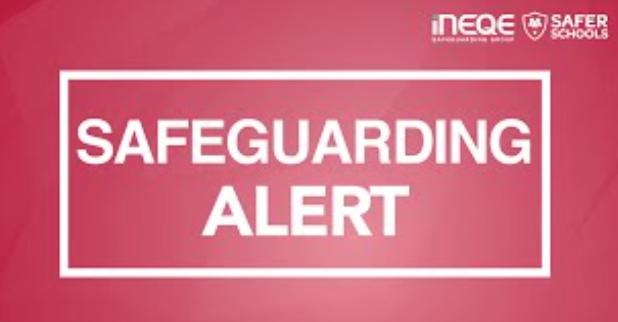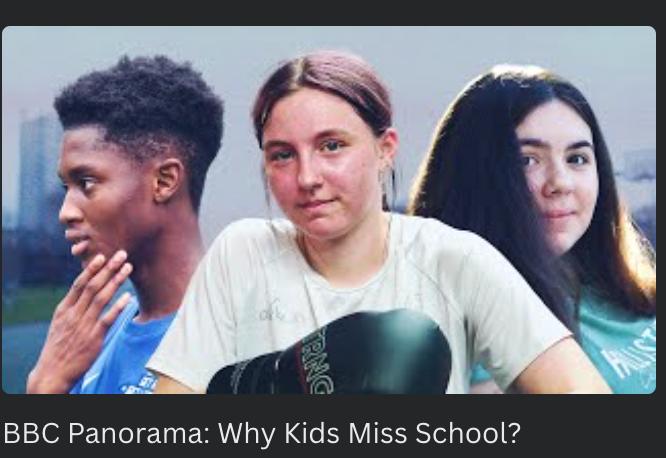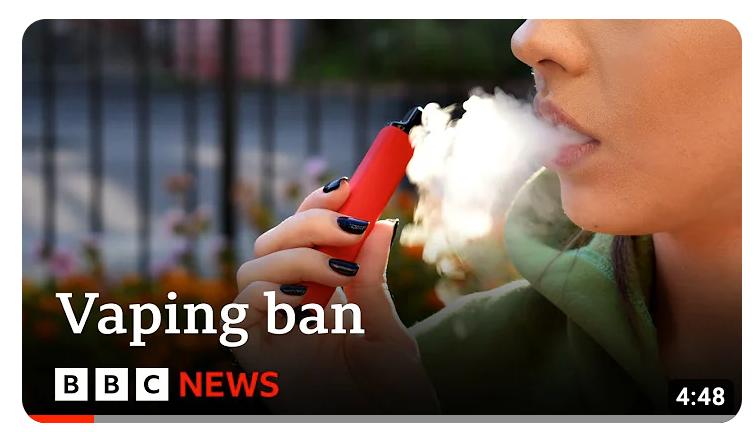TheSafeguardingTeam



 AnnaCutts DSL
MichelleLucasHalliwell DDSL
ChrisReid DDSL
AndrewHailes DDSL
AnnaCutts DSL
MichelleLucasHalliwell DDSL
ChrisReid DDSL
AndrewHailes DDSL
DSL@cheltenham college.org.uk
PaulHayes DDSL
We have previously reported a dangerous online platform called Omegle and the risks it poses to children and young people who visit it. We know from speaking to some of our pupils that they are still accessing it so we have decided to release further information.




Omegle is a free anonymous online chatroom where users are randomly paired with strangers to chat via video call or instant messaging. It is popular, and is primarily accessed on a web browser Videos showcasing Omegle chats have popped up on platforms like Instagram and TikTok, which have added to its popularity with children and young people.

TIKTok has recently introduced Family Pairing, which allows parents to link their account with their child’s to control their settings remotely. For example, parents can turn on restricted mode and screen time limits and disable direct messages right from their own phone. Children cannot change these settings without parental approval.




CEOP has created resources aimed at parents to better eqip you to have conversations with your child about the Dark Web.

CEOP has also launched #AskTheAwkward? Young people are using online spaces for their social and romantic lives. They told us that they would like their parents and carers to talk with them more about this. We know that these topics aren’t always easy to talk about, so #AskTheAwkward has been created to help you to explore online relationships with your secondary aged children, making these conversations part of everyday life
 Press on the icon for parental control guides for Apple, Android and other devices
Press on the icon for parental control guides for Apple, Android and other devices
The Children’s Society has developed a new ‘Slang Dictionary’ which has been designed to support parents, carers and professionals to better understand the language young people may be using in order to support them and safeguard them Even if you feel the dictionary might not apply to your child, they may be explosed to such language online, particularly in chatrooms How many do you know?
The Slang Dictionary The Emoji Dictionary
The following are a list of TV programmes that highlight issues. Watching a programme like this can be a good starting point for a conversation with your child about a specific topic
Theme Title Programme

Online safety
The Secret World of Trading Nudes
https://www.bbc.co.uk/iplayer/episode/ m001bf69/panorama-the-secretworld-of-trading-nudes
Exploitation
Private ADHD Clinics Exposed
https://www.bbc.co.uk/iplayer/episode/ m001m0f9/panorama-private-adhdclinics-exposed
Online sexual harrassment
Emily Atack: Asking for It?
https://www.bbc.co.uk/iplayer/episode/ m001hs5v/emily-atack-asking-for-it
Cyberbullying
Jesy Nelson: 'Odd One Out'
Domestic violence Abused By My Girlfriend
https://www.bbc.co.uk/iplayer/episode/ p07lsr4d/jesy-nelson-odd-one-out
https://www.bbc.co.uk/iplayer/episode/ p0700912/abused-by-my-girlfriend

If you have watched or listened to something that you would like to share with the safeguarding team, please email Michelle L-H (m lucas-halliwell@cheltenhamcollege org)


Absenteeism has become endemic in schools across the country Despite concerted efforts, absence rates are not improving. School absence was around 4.7% in the years before the pandemic struck, rising to 7.5% last year, according to Department for Education data. However, persistent absenteeism – where pupils miss 10% or more classes – has more than doubled in the UK, rising from 10 9% in 2018-19, to 22 5% last year, which equates to 1.6 million pupils, and the number is not going down. Attendance data for last academic year up to thr 31st of March 23, shows the rate was 22.6%.
One of the theories as to why more children are regularly missing school is that lockdowns made missing school permissible for many, They were forced to spend so much time at home when they should have been socialising Many don’t want to leave the security and safety home offers Many schools, especially those in the independant sector were able to provide such excellent access to online learning via platforms such as Teams that pupils find it hard to undersatand why they have to go back to face to face learning
How does attendance affect outcomes for pupils?
Every moment in school counts, and days missed add up quickly. For example, a child in 4th form who is absent for three days over a half term could miss 24 lessons in total The higher a pupil’s attendance, the more they are likely to learn, and the better they are likely to perform in exams and formal assessments Being around teachers and friends in a school is the best way for pupils to learn and reach their potential. Time in school also keeps children safe and provides access to extra-curricular opportunities and pastoral care
Your child has a medical appointment that cannot be arranged outside of school hours


Your child has fallen out with friends. They need to talk to us to help solve the problem instead of avoiding it
You child is unwell with a temperature or a rash

Your child has had a bad night's sleep, it will not help to let them sleep in as that will interrupt their circadian rhythm If poor sleep is a persistent problem, speak to us as we can help


You child is unwell with sickness/diarrhea


Some young people find it extremely hard to cope away from their tech or from gaming. If this is becoming a problem, talk to us for advice and help


Your child has a headache One of the most common reasons for this is dehydration
Make sure they have a drink to bring with them and take painkillers before school
Next time your child is keen to avoid school, here are some things that you can do to help -
Early intervention is important, as the longer children are away from school, the harder it can get for them to return
Reach out, as soon as you can Contact your child's tutor or HsM They can offer help and advice or refer to you to the Safeguarding Team.
Focus on talking, listening, emphasising and reassuring. If it is hard for you to talk to your child (and this can be understandable), see if there is someone who can act as an intermediary. Young people are more likely to have a heart-to-heart with somebody where there is no history of conflict and no emotional baggage

Follow a routine, If your child’s reluctance is stemmed from anxiety, a calm, familiar routine can help with security and stress reduction
Stick to the plan, for at least half a term It is important to have some consistency because that will increase the child’s sense of security and give them a routine. It also gives all parties the chance to evaluate the success of the strategy
If you would like more information on this subject, contact the safeguarding team and/or watch the following
If you think vaping is better than smoking it is time to think again.
Vapes or e-cigarettes were once hailed as miracle devices to help adults stop smoking However, rather than being something that adults use as an alternative to smoking, vaping has become epidemic in schools across the country You can see how eaily this has happened, especially since many vapes come in brightly-coloured packaging, in innocent-sounding flavours, such as watermelon and candy floss. It therefore comes as no surprise that vaping has proved enticing to teens and even younger children.
There are many problems associated with vaping:
The use of vapes is unsafe for young people and have been associated with respiratory illness such as bronchitis.
As vaping is relatively new, we are still yet to fully understand the impact vaping has on the human body, especially teens and young adults
Most vapes contain large amounts of nicotine Nicotine is highly addictive and can harm adolescent brain development, which continues into the early to mid-20s. It also really affects concentration, especially in lessons and in exams, as many cannot go long without a nicotine fix.
Vapes can contain other harmful substances besides nicotine

Young people who use vapes may be more likely to smoke cigarettes in the future
Some of the ingredients in e-cigarette aerosol could also be harmful to the lungs in the long-term. For example, some e-cigarette flavorings may be safe to eat but not to inhale because the gut can process more substances than the lungs

Defective e-cigarette batteries have caused some fires and explosions, a few of which have resulted in serious injuries.
Recent research suggests that vaping could cause fertility issues, especially in boys.
Our health centre have nurses who are trained in helping young people overcome their vaping addiction If you have any questions or concerns, please contact them direct on nurses@cheltenhamcollege.org.uk







 AnnaCutts DSL
MichelleLucasHalliwell DDSL
ChrisReid DDSL
AndrewHailes DDSL
AnnaCutts DSL
MichelleLucasHalliwell DDSL
ChrisReid DDSL
AndrewHailes DDSL







 Press on the icon for parental control guides for Apple, Android and other devices
Press on the icon for parental control guides for Apple, Android and other devices














